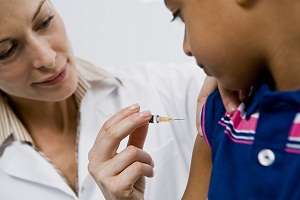“Five to nine year-old children and 10 to 14 year-old adolescents are the biggest carriers and potential transmitters of infections to infants so that’s where our focus is at present,” Prof Mukkur says. Credit: Sanofi Pasteur
Perth researchers developing a new whooping cough vaccine have described immune responses produced in pre-clinical testing with the new vaccine as 'exquisite'.
Curtin University School of Biomedical Sciences lead researcher Associate Professor Trilochan Mukkur says research reached an important milestone recently with the new vaccine showing suitability for use in people who have already been inoculated.
"Pre-clinical modelling shows vaccinated subjects can skew their immune responses to those types likely to provide longer-term protection," he says.
Prof Mukkur says clinical trials are expected to start within the next two to three years and the product should be on the market in the next five to eight years.
He says the new vaccine will have a number of advantages over the old one.
These advantages include that it would be administered by nasal spray, eliminating the distress, particularly in very young children and adolescents, of having a needle and swelling at the injection point that occurs in 20 to 30 per cent of recipients.
It is also being designed to have 'inconsequential toxicity' and long-term protection reducing the need for repeated booster immunisations.
"What this means is that there will be no toxicity felt because the vaccine strain does not survive in the vaccinated individual long enough to cause any problems," Prof Mukkur says.
"In addition, the existing vaccine provides relatively short-term protection – three to five years mandating multiple boosters for protection for longer periods.
"Our vaccine is likely to provide a very long-term protection so there may not be a need for a booster.
"If there is [a need, then] certainly not more than one booster, whereas the current vaccine requires nearly seven to eight boosters throughout one's lifetime."
In 2011 there were approximately 38,500 cases of whooping cough in Australia but an intensive vaccination program reduced the figure to 26,000 in 2012.
Prof Mukkur says this is still too high for a preventable infectious disease.
"Whooping cough is an infection that if passed on to vulnerable babies can be potentially fatal," he says.
"Initially the target population for this vaccine will be adults then adolescents and then children.
"Five to nine year-old children and 10 to 14 year-old adolescents are the biggest carriers and potential transmitters of infections to infants so that's where our focus is at present."
Provided by Science Network WA



















